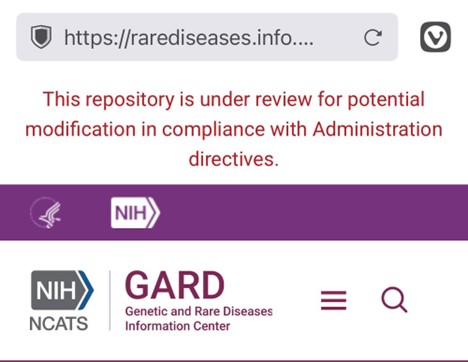This post was written by Camille Regnault, Senior Scholarly Communications Assistant in the Research Data Management team.
Overview:
Earlier this year, several reports raised concerns about National Institutes of Health (NIH)-funded data repositories—critical to research and public health—being flagged for potential ‘review,’ prompting widespread unease within the scientific community.

These reports have emerged against a backdrop of sweeping grant terminations and cuts to research considered to be related to DEI programs, following Presidential Executive Orders in the US and a regime change under the NIH.
The NIH is the largest funder of biomedical research in the world and one of eleven divisions that fall under the US Department of Health and Human Services, making important discoveries that improve health and save lives. It is a key provider of resources such as PubMed and PubMed Central (PMC), for medical and health research as well as ClinicalTrials.gov, for clinical trial data.
The NIH is also Imperials’ most commonly applied to US Federal Funding agency and the university holds many awards both as the Lead and as a Partner.
In the wake of these major shakeups however, it has additionally become clear that access to a variety of federally-created and federally-hosted datasets has been limited or removed while access to others remains potentially at risk.
Data rescue efforts and stakeholder responses:
In February 2025, the Data Rescue project emerged as the result of a coordinated effort between three data organisations, including members of IASSIST, RDAP, and the Data Curation Network, to attempt to safeguard threatened research data.
Their stated goal is ‘to serve as a clearinghouse for data rescue-related efforts and data access points for public US governmental data that are currently at risk’ and their efforts include ‘data gathering, data curation and cleaning, data cataloging, and providing sustained access and distribution of data assets’. You can read about their current efforts, here.
In the same month, the Harvard Law School Library Innovation Lab Team released the data.gov archive on Source Cooperative. The 16TB collection is available to access at https://source.coop/repositories/harvard-lil/gov-data/description and includes over 311,000 datasets harvested during 2024 and 2025. This is being updated on a daily basis as new datasets are added to data.gov.
In the UK members of the Chartered Institute of Library and Information Professionals (CILIP) Special Interest Groups, covering health and higher education, have identified concerning examples of removal and reduction of content relating to their work in public health, research, education, and science. Their recent statement invites members and the wider information profession community to share examples of how content, reports, datasets, evidence, and tools are being removed by US authorities.
What you can do:
- If you’re an Imperial researcher or staff member affected by these changes, we strongly encourage you to reach out to the Research Data Management team. Your insights could help shape our response and contribute to broader sector-wide documentation efforts.
- Stay informed by subscribing to the Data Rescue Project’s newsletter, which provides regular updates on the initiative’s progress. You can also explore opportunities to get involved and support their mission to safeguard vulnerable datasets here.
- Additionally, if you’re a CILIP member or an information professional working within the UK sector, you can help assess the impact by completing a short form. Share examples of affected content, datasets, tools, or evidence to aid in understanding the scale and implications of these changes across the UK.
